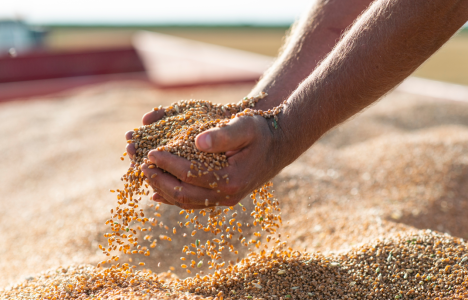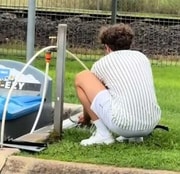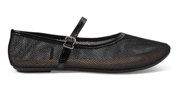Discover the Revolutionary Sunshine Coast Mill that's Transforming Lives in the First Nations Community!
By
Gian T
- Replies 3
In the heart of Queensland's Sunshine Coast, a revolution is quietly taking root. Here, in an industrial estate that belies the cultural significance of its operations, a Gamilaraay man named Jacob Birch is leading a transformative enterprise. His mission? To turn native grains, which have thrived on Australian soil for tens of thousands of years, into a pantry staple for all Australians while empowering First Nations people.
The enterprise, known as Yaamarra and Yarral, is more than a mere milling operation. It's a beacon of hope and a symbol of resilience. Birch's vision is to create an industry that remains firmly in Indigenous hands, fostering employment, reconnecting cultural knowledge, and improving the health of First Nations Australians through the power of native 'superfoods.'
'We're trying to bring back a 60,000-year-old food system into a modern context, but retain that authenticity and integrity,' Birch explains. His drive is fueled by a stark reality: less than 2 percent of the bush food industry's produce is generated by Indigenous people. Determined to change this, Birch has rallied community members from across the nation to join him in this cause.
The concern is real and shared by many, including Yuin, Bunurong, and Tasmanian man Bruce Pascoe, a farmer and author of the influential book 'Dark Emu.' Pascoe echoes Birch's sentiments, emphasizing the importance of ensuring that Aboriginal people benefit from the burgeoning interest in bush foods to prevent yet another form of dispossession.
The story of the Kakadu plum serves as a cautionary tale. Once a local industry in the making, it was usurped as the plant was cultivated in places as far-flung as Hawaii, leaving the traditional owners without control. 'We're not trying to exclude people from the market, but we are saying we've got to be part of it,' Pascoe asserts.
Integral to this movement is the role of women, such as Gamilaraay and Yuwallaraay woman Rhonda Ashby. She is part of the Gamilaraay People Food Sovereignty Working Group and is actively involved in creating a seed bank with the women of Lightning Ridge. Their goal is to be ready to plant on a larger scale, overcoming one of the project's most significant hurdles: access to land.
Ashby sees the cultivation of native grains as a means to strengthen cultural knowledge, which encompasses food, medicine, stories, songs, language, dance, and art. She believes that these native grains could be the key to better health, particularly for Indigenous Australians. 'If our people become overall good with their wellbeing and their wellness, I think the country will heal as well,' she says.
The health benefits of these native grains are not just anecdotal. Research has shown that some gluten-free species boast high antioxidants, comparable to blueberries, and contain iron levels as potent as beef liver supplements, with twice the calcium of full cream cow's milk.
However, the journey to bring these grains to the forefront of Australian cuisine is not without its challenges. Eastern Arrernte woman Tanika Orr, a bush tucker chef on the Sunshine Coast, points out that the scarcity of native grain mills and cultivators leads to low supply and high prices. Orr dreams of a future where Indigenous communities across Australia cultivate their native grasses, revitalizing the land and their traditions.
As Birch prepares to travel to the United States to learn from Indigenous communities who are decades ahead in revitalizing traditional food systems, he is inspired by their success. From harvesting wild rice to controlling the entire supply chain, these communities are asserting their rights and setting a precedent for what could be achieved in Australia.
The Sunshine Coast mill is more than a place where grains are processed; it's a hub of cultural revival and economic empowerment. It stands as a testament to the resilience and ingenuity of the First Nations people, who are reclaiming their heritage and sharing it with the world. As this enterprise grows, it promises not only to nourish bodies but also to heal spirits and strengthen the bonds between the land and its original custodians.
 We at the Seniors Discount Club celebrate this initiative and the positive impact it has on the First Nations community. It's a reminder that when we support such enterprises, we're not just buying food; we're participating in a movement that honors the past and sows seeds for a sustainable future. What are your thoughts on incorporating native grains into your diet? Have you tried any bush foods that you've particularly enjoyed? Share your experiences and let's discuss the rich culinary heritage that Australia has to offer!
We at the Seniors Discount Club celebrate this initiative and the positive impact it has on the First Nations community. It's a reminder that when we support such enterprises, we're not just buying food; we're participating in a movement that honors the past and sows seeds for a sustainable future. What are your thoughts on incorporating native grains into your diet? Have you tried any bush foods that you've particularly enjoyed? Share your experiences and let's discuss the rich culinary heritage that Australia has to offer!
The enterprise, known as Yaamarra and Yarral, is more than a mere milling operation. It's a beacon of hope and a symbol of resilience. Birch's vision is to create an industry that remains firmly in Indigenous hands, fostering employment, reconnecting cultural knowledge, and improving the health of First Nations Australians through the power of native 'superfoods.'
'We're trying to bring back a 60,000-year-old food system into a modern context, but retain that authenticity and integrity,' Birch explains. His drive is fueled by a stark reality: less than 2 percent of the bush food industry's produce is generated by Indigenous people. Determined to change this, Birch has rallied community members from across the nation to join him in this cause.
The concern is real and shared by many, including Yuin, Bunurong, and Tasmanian man Bruce Pascoe, a farmer and author of the influential book 'Dark Emu.' Pascoe echoes Birch's sentiments, emphasizing the importance of ensuring that Aboriginal people benefit from the burgeoning interest in bush foods to prevent yet another form of dispossession.
The story of the Kakadu plum serves as a cautionary tale. Once a local industry in the making, it was usurped as the plant was cultivated in places as far-flung as Hawaii, leaving the traditional owners without control. 'We're not trying to exclude people from the market, but we are saying we've got to be part of it,' Pascoe asserts.
Integral to this movement is the role of women, such as Gamilaraay and Yuwallaraay woman Rhonda Ashby. She is part of the Gamilaraay People Food Sovereignty Working Group and is actively involved in creating a seed bank with the women of Lightning Ridge. Their goal is to be ready to plant on a larger scale, overcoming one of the project's most significant hurdles: access to land.
Ashby sees the cultivation of native grains as a means to strengthen cultural knowledge, which encompasses food, medicine, stories, songs, language, dance, and art. She believes that these native grains could be the key to better health, particularly for Indigenous Australians. 'If our people become overall good with their wellbeing and their wellness, I think the country will heal as well,' she says.
The health benefits of these native grains are not just anecdotal. Research has shown that some gluten-free species boast high antioxidants, comparable to blueberries, and contain iron levels as potent as beef liver supplements, with twice the calcium of full cream cow's milk.
However, the journey to bring these grains to the forefront of Australian cuisine is not without its challenges. Eastern Arrernte woman Tanika Orr, a bush tucker chef on the Sunshine Coast, points out that the scarcity of native grain mills and cultivators leads to low supply and high prices. Orr dreams of a future where Indigenous communities across Australia cultivate their native grasses, revitalizing the land and their traditions.
As Birch prepares to travel to the United States to learn from Indigenous communities who are decades ahead in revitalizing traditional food systems, he is inspired by their success. From harvesting wild rice to controlling the entire supply chain, these communities are asserting their rights and setting a precedent for what could be achieved in Australia.
The Sunshine Coast mill is more than a place where grains are processed; it's a hub of cultural revival and economic empowerment. It stands as a testament to the resilience and ingenuity of the First Nations people, who are reclaiming their heritage and sharing it with the world. As this enterprise grows, it promises not only to nourish bodies but also to heal spirits and strengthen the bonds between the land and its original custodians.
Key Takeaways
- A Gamilaraay man, Jacob Birch, is spearheading an initiative on the Sunshine Coast to create a native grain milling enterprise named Yaamarra and Yarral, aiming to involve First Nations growers from across Australia.
- The project seeks to keep the native grain industry in Indigenous hands, create employment, connect cultural knowledge, and improve the health of First Nations Australians with the cultivation and consumption of native 'superfood' grains.
- Renowned author and farmer Bruce Pascoe supports the enterprise, emphasising the importance of ensuring that Aboriginal people benefit from the industry and do not experience further dispossession like what occurred with the Kakadu plum.
- The initiative also includes developing a seed bank and strengthening cultural knowledge, with a focus on reconnecting to the land and health benefits of native grains that offer high nutritional value and are integral to Indigenous culture and storytelling.









